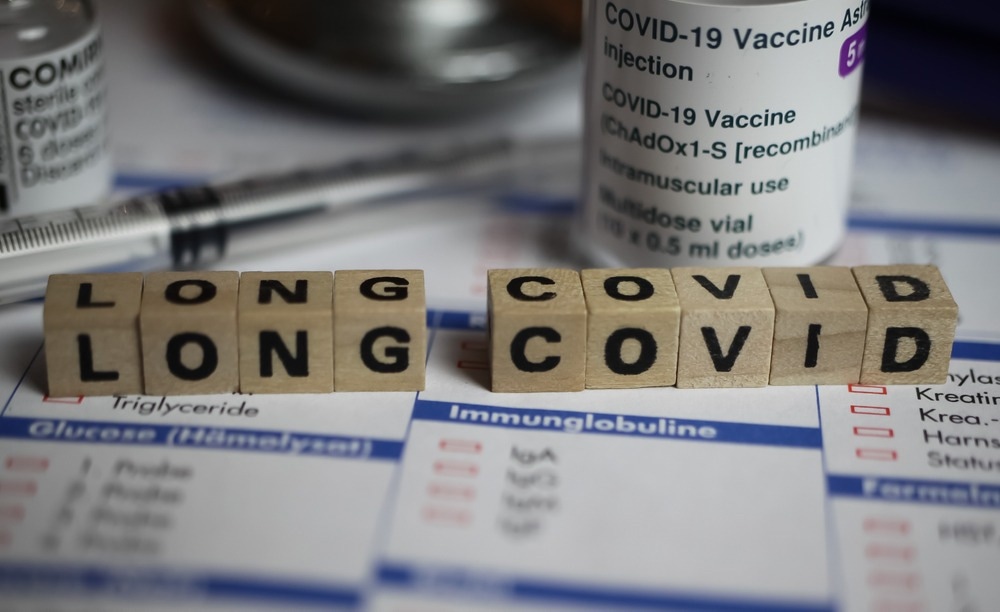They also aimed to determine the association between severe acute respiratory syndrome coronavirus 2 (SARS-CoV-2) vaccination and long COVID symptom development.

Study: A prospective cohort study assessing the relationship between long-COVID symptom incidence in COVID-19 patients and COVID-19 vaccination.Image Credit:RalfLiebhold/Shutterstock.com
Background
Persistent SARS-CoV-2 infection symptoms have been reported following acute COVID-19. Post-COVID-19 condition (PCC) or long COVID refers to new, ongoing, or recurring symptoms following 12.0 weeks of SARS-CoV-2 infection, unexplainable by alternate diagnoses.
According to the World Health Organization (WHO), the development or persistence of COVID-19 symptoms after three months of COVID-19 (confirmed or suspected), with symptoms persisting for more than two months without any alternate explanation, is long COVID.
PCC symptomatology and frequency may vary among individuals, involving multiple organs and organ systems, affecting mental or physical health, and occupational or functional status, resulting in persistent morbidities, with partial or full recovery, over months or years.
Studies have reported that COVID-19 vaccines protect against COVID-19 development and COVID-19 severity outcomes. However, the effects of COVID-19 vaccination on PCC frequency and symptomatology are not well-characterized.
About the study
In the present prospective cohort-type study, researchers followed SARS-CoV-2-positive patients to assess long-term COVID-19 symptoms persisting beyond day 90 of COVID-19 onset.
The study comprised 669 real-time reverse transcription-polymerase chain reaction (RT-PCR)-confirmed COVID-19 patients diagnosed between September 16 and October 5, 2021, at the Tulkarm primary health care (PHC) directorate of the West Bank, Palestine.
Clinical and sociodemographic data, including age, sex, contact details, and the SARS-CoV-2 infection date, were retrieved from the electronic medical records.
In addition, semi-structured telephonic interviews were conducted on day 10, day 30, day 60, and day 90, to obtain data on smoking habits, occupation, medical history, prior COVID-19 history, SARS-CoV-2 vaccination status, and new or persistent symptoms following SARS-CoV-2 infection.
Long COVID-19 symptoms assessed included cough, fever, fatigue, dyspnea, ageusia, anosmia, insomnia, arthralgia, headache, dyspnea, and brain fog.
Dyspnea and fatigue were assessed using the modified medical research council (mMRC) scale and fatigue assessment scales (FAS), respectively. All participants were aged above 18 years and registered with the health information system. Individuals unable to respond to the questionnaires and those lost to follow-up were excluded from the analysis.
Multivariate-type logistic regression modeling was performed, and the adjusted odds ratio (aOR) values were calculated. The study was terminated in end-January, 2022.
Results
The mean participant age was 36 years; 43% (n=288) of participants were men, 29% (n=191) were smokers, and 56% (n=371) were employed. Among the participants, 18% (n=128) were hypertensive, seven percent (n=45) had a prior COVID-19 history, and seven percent (n=45) were hospital-admitted.
Before infection, 41% (n=274) of individuals had received complete COVID-19 vaccines, and 23% (n=64) received single-dose vaccination. Moderna, Pfizer, and Sputnik Light vaccines were administered to four percent (n=25), 18% (n=119), and 13% (n=85) of SARS-CoV-2 vaccinees, respectively.
Ten days after SARS-CoV-2 infection, the most prevalent symptoms were dyspnea, cough, insomnia, and fatigue, reported by 39%, 32%, 32%, and 29% of participants, respectively. Fatigue and dyspnea remained the most prevalent symptoms 90 days after SARS-CoV-2 infection among 15% (n=100) and 20% (n=134), respectively.
PCC symptom incidence was 42. Women, older individuals, individuals requiring hospital admission, individuals experiencing fatigue 60 days after infection, and dyspnea after 10 days of infection were at an elevated risk of developing long-COVID. With aOR values of 1.5, 4.9, 5.0, 3.1, and 2.4, respectively.
The risk of long COVID symptom incidence was greater among unvaccinated individuals than vaccinated individuals by 7.0-fold (aOR 6.9).
Conclusions
Overall, the study findings showed that post-COVID-19 conditions were commonly observed among SARS-CoV-2-positive individuals, with greater rates for women, older aged individuals, hospital-admitted individuals, and patients experiencing fatigue and dyspnea. Whereas COVID-19 vaccination conferred protection.
The majority of COVID-19 patients recovered within a few weeks of acute COVID-19; however, 41% of the sample population had ≥1.0 symptoms 90 days after infection.
The most persistent COVID-19 symptoms were fatigue, dyspnea, insomnia, headache, and smell and/or taste loss. Public health interventions must be aimed at educating healthcare professionals, increasing awareness of long COVID, and promoting the administration of SARS-CoV-2 vaccines.
Further research must be conducted with objective-type evaluations, physical assessments, and longer follow-up periods to assess all factors that may increase PCC risks.